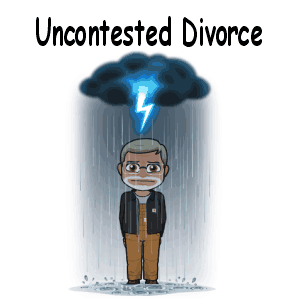Quick Links

Uncontested Divorce

FAQ

Information
Glossaries
Santillan Law understands that sometimes a marriage just is not working for both parties and both parties agree that a divorce is in order. This type of divorce is sometimes called a no fault or amicable divorce, Lawyers refer to it an “Uncontested Divorce”. In summary if you and your spouse have decided that through no fault of either partner the marriage is irretrievable then this may be the right path for you to take.
Many people facing a divorce in Pennsylvania view it as a difficult process. There is the deep emotional hurt you may feel about breaking up with your spouse. There is the fear of starting a whole new life for yourself and all of the uncertainties that go along with that. Then there are the legal challenges that include lawyers and the judicial system that you may be facing for the first time in your life. Fortunately, the legal challenges in the divorce process can be greatly reduced if the other spouse agrees to an uncontested divorce.
An uncontested divorce occurs when both parties to the divorce agree on all of the main issues of the divorce. A couple may agree to property division, alimony and child support. However, the couple will still need to file a number of forms with the court, whether or not it is contested. For more information about how uncontested divorce works and common terms used in family law please review our FAQs below.
For more detailed information please contact us to set up an appointment to discuss the details and feasibility of an uncontested divorce. We are here to help you on your journey. At Santillan Law we do not take sides we just try to help you through a difficult time so both you and your former spouse can move on to better lives.
FAQ Uncontested Divorce
- Uncontested Divorce Can Be Cheaper and Faster – With an uncontested divorce, you and your spouse are basically saying that you agree that the marriage is irretrievably broken. Procedurally, this allows the parties to request a divorce decree as soon as 90 days after the divorce complaint is filed and served on the other spouse.
- Other Divorce Related Matters and Settlements – In an uncontested divorce, the parties still have to negotiate important matters such as alimony or spousal support, property division (e.g. savings accounts, retirement funds, and real estate), child support, and child custody. However, when both parties do consent to the divorce, the parties are more likely able to amicably resolve these other matters.
- Relationship after Divorce – When parties proceed with an uncontested divorce, and they are able to amicably resolve the other matters, the parties are often able to better manage their post-divorce relationship. Usually divorced couples do not maintain any relationship; however, when minor children are involved, divorced couples still have to co-parent. This requires constant and almost daily communication between the parents. When spouses have avoided a bitter and acrimonious divorce process, they are often better suited to work together as parents for the best interests of the children.
When you’re filing for an uncontested divorce, a Pennsylvania judge may not sign your final divorce decree until at least 90 days have passed since you filed the complaint. This waiting period is intended to give the spouses time to think about the consequences of a divorce, and to request counseling from the court if they feel it would be beneficial.
- State residency – At least one of the spouses must have been a resident of the state for at least six months immediately before filing the divorce papers. (23 Pa. Cons. Stat. § 3104(b) (2022).)
- Agreement on the reason for your divorce – As in all states, you need a legally accepted reason (or “ground”) for divorce in Pennsylvania. The state allows divorce based on both “fault” grounds and “no-fault” grounds. In a divorce based on one of the fault grounds, you would claim that your marriage is ending because your spouse engaged in a certain kind of misconduct, like adultery, desertion, or cruelty. Most of the time, your spouse would deny your claims, leading to a drawn-out legal battle. In a no-fault divorce, neither spouse is accusing the other of wrongdoing
- Agreement on the issues in your case – Before you file for an uncontested divorce, you and your spouse will need to work out agreements on all the issues involved in ending your marriage, including:
- how to divide your marital property, including any real estate, personal property, and other assets how to allocate responsibility for repaying outstanding debts
- whether either spouse will pay the other alimony and, if so, how much
- child support for any dependent children that you and your spouse have, and
- child custody and visitation.
- It’s important to remember that if you don’t ask for alimony or a distribution of marital property as part of the divorce, you may not request it later.
General Family Law Terms
Alimony is financial support paid by one ex-spouse to the other after the marriage has legally ended. Alimony must be requested during divorce proceeding. Either part may request alimony. If the parties cannot agree on alimony then the court will decide if it is warranted and the amount to be paid. Like child support alimony can be modified after the divorce in a separate proceeding
Traditionally, the common law denied grandparents visitation with a child over a parent’s objections. But since 1965, all 50 states and the District of Columbia have enacted legislation enabling grandparents to petition the courts for visitation rights with grandchildren. The laws do not make granting of visitation rights automatic—they merely give grandparents the right to ask for a visitation order.
The court has the power to hold a party in contempt for violating a court order. The contemnor must be allowed an opportunity to “purge” the contempt, meaning to comply with the order. If the contemnor does not purge the contempt and has the ability to pay, the court has the power of incarceration, although usually for a limited amount of time, such as six months per contempt citation. In addition, many states have criminal penalties for failing to pay child support. Recently, Congress has enacted many new enforcement mechanisms, creating greater collaboration between federal and state governments. These include suspension of driver’s licenses and professional licenses, seizure of tax refunds, seizure of bank accounts and investment accounts, and even publishing the name and picture of the “dead-beat parent” on posters and in newspapers. The law also improves interstate enforcement by bolstering federal services to locate parents across state lines and by requiring all states to have common paternity procedures in interstate cases.
Support in Pennsylvania is calculated pursuant to a formula, which we call “guidelines”. These guidelines apply only when the net monthly income of husband and wife is $20,000.00 or less and there are 6 or less children. These guidelines consider the income of the husband and wife ONLY. One’s expenses are not considered in calculating a support obligation, unless one has what the law considers an “extraordinary expense”, which is outside the contemplation of the guidelines. In addition to the support amount, other expenses such as child care, and medical expenses, for example, are not part of the guidelines but are shared by the parties in addition to the support amount. Support is never a permanent order. It is always modifiable if there is a change of circumstances which would warrant either an increase or a decrease.
Joint custody has two parts: joint legal custody and joint physical custody. A joint custody order can have one or both parts.
Joint legal custody refers to both parents sharing the major decisions affecting the child, which can include school, health care and religious training
Joint physical custody refers to the time spent with each parent.
Generally, spouses are free to divide their property as they see fit in what is called a “marital settlement agreement,” which is a contract between the husband and the wife that divides property and debts and resolves other issues of the divorce. Although many divorces begin with a high level of acrimony, a substantial majority are settled without the need for a judge to decide property or other issues. However, if the division of property cannot be settled, then the court must make the determination. As a starting point, many states allow both parties to keep their “nonmarital” or “separate” property.
The grounds for divorce depend on the state, and may be based on no-fault or fault. A no-fault divorce is available in Pennsylvania, like many states we also have fault-based grounds as an additional option. A no-fault divorce is one in which neither the husband nor the wife officially blames the other for the breakdown of the marriage. The list of grounds for a fault-based divorce may include: adultery, physical cruelty, mental cruelty, attempted murder, desertion, or a number of other reasons. In the case of most couple seeking divorce a no fault divorce is the typical option.




